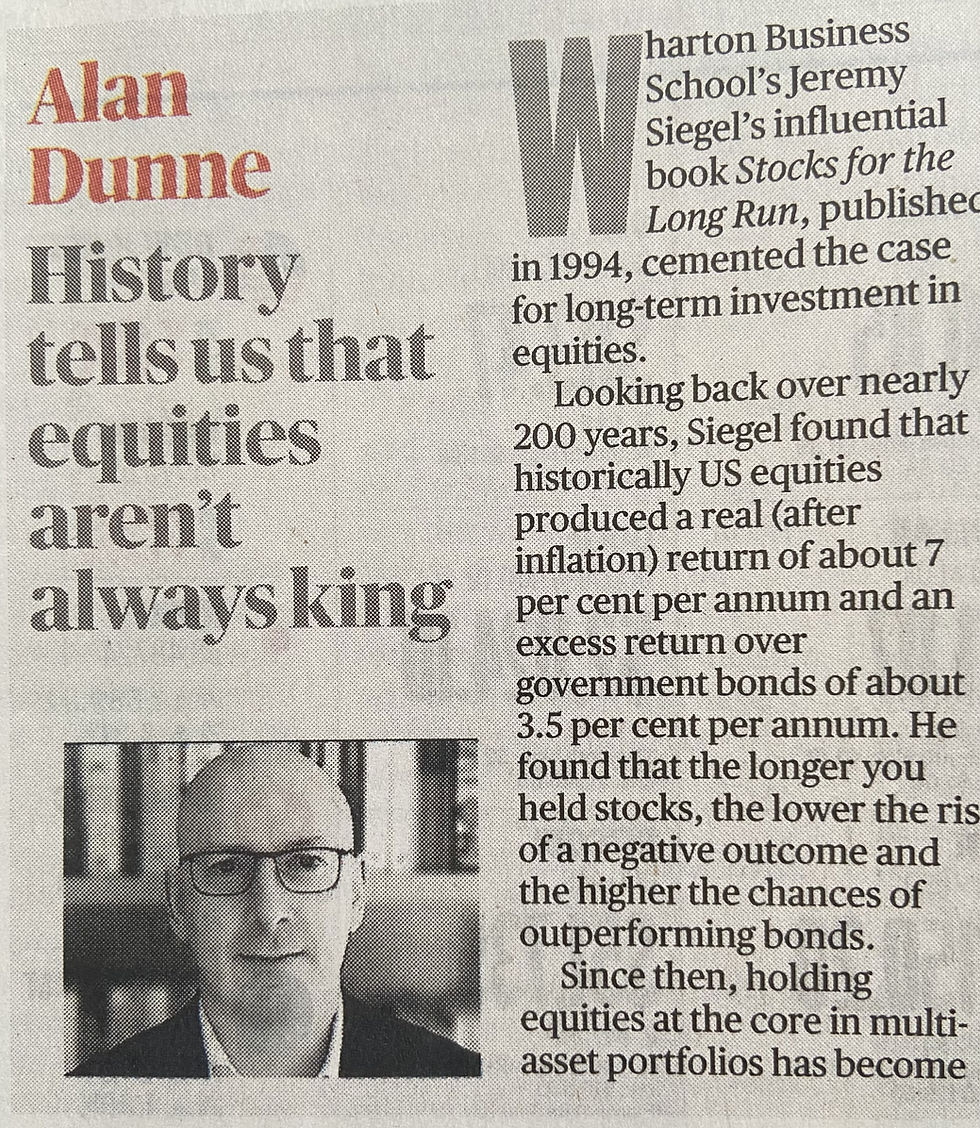Stocks for the long run? History tells us equities aren't always king
- Feb 19, 2024
- 4 min read

February 2024
This article appeared in the Sunday Times on 18th February 2024
When Wharton Business School’s Jeremy Siegel published his influential book Stocks for the Long Run in 1994 the case for long-term investment in equities was cemented.
Looking back over nearly 200 years, Siegel found that historically US equities produced a real (after inflation) return of about 7% p.a. and an excess return over government bonds of about 3.5% p.a. He found the that the longer you held stocks, the lower the risk of a negative outcome and the higher the chances of outperforming bonds.
Since then holding equities at the core in multi-asset portfolios has become standard practice. Indeed, for investors with long time frames or high risk appetite, financial advisors might advise being almost exclusively invested in equities.
It hasn’t always been this way. In the UK up until the 1950s pension funds tended to overweight bonds. That changed after George Ross Goobey took over the management of the Imperial tobacco fund in 1947. He correctly identified that stocks were cheap relative to bonds, moved the portfolio into equities and substantially outperformed peers. This sparked what became known as “the cult of the equity”.
Recently, Professor Edward McQuarrie of Santa Clara University has challenged the conventional wisdom again. In a research paper he re-examined the US data back to 1800, including a more comprehensive data set than was available to Jeremy Siegel, and also the international evidence.
McQuarrie concludes that the case for consistent equity outperformance may not be as strong as previously assumed. Certainly stocks outperformed over the very long run but there were prolonged periods particularly in the 1800s in the US when this was not the case.
While the revised data is interesting, critics might question the relevance of equity returns in the 1800s for current markets. For much of the 1800s the US had an agrarian economy and it was only from 1870 as the Second Industrial Revolution took hold that economic growth really accelerated.
That said two aspects of McQuarrie’s analysis are worth noting. First, looking at the international data the evidence of consistent equity outperformance is somewhat less compelling. He highlights a number of multi-decade periods in various countries where equities delivered poor returns.
For example, after the bubble of the 1980s, Japanese equities generated negative real returns of about -5% per annum over the 20 years to 2009. In Italy in the 50 years to 2011 equities produced a negative real return of -0.5% p.a. and in Switzerland in the 30 years to 1991 equity returns annualised -0.8% per annum.
Much of the confidence in stocks for the long run stems from the strong performance of US equity markets. In fact, for the World ex USA, in the 50 years to 2023, equities just marginally outperformed bonds according to the Credit Suisse Investment Returns Yearbook.
Second, McQuarrie suggests rather averaging the returns since 1800, it may be prudent to consider that the economy goes through different regimes and this influences asset market returns. The regime between 1940 and 1980 in the US (with strong economic growth) was particularly favourable for stocks. The regime since 1980 (of declining inflation and interest rates) was favourable for both bonds and stocks. The regime prior to 1940 was less favourable for stocks.
The implication for investors and advisors is that rather than assuming that equities will always deliver better outcomes the longer the holding period, it may make sense to frame the asset allocation decision in terms of regimes – in a favourable regime stocks can be expected to outperform but we don’t know what the next 10, 20 or 50 years will look like.
From that perspective, it important to recognise that the economic regime in recent decades of falling inflation and falling bonds yields has been particularly favourable for equities and bonds.
However, since 2020 inflation has picked up and the emerging trends of decarbonization, deglobalization, rising debt levels, shifting demographics and rising entitlement spending all now point to a changed and potentially more challenging regime in the years and decades ahead.
Although Alternative Intelligence could deliver enormous benefits for the economy in enhancing productivity in the coming decades, the magnitude and the timing of these effects are highly uncertain.
All of that suggests the even for investors with long time horizons and/or strong risk appetite it still makes sense to think in terms of building a robust portfolio that might perform in various economic regimes rather than being heavily exposed to equity risk.
To protect against higher inflation and a potentially more volatile macroeconomic backdrop in the coming years there is a solid case for gold, commodities, real assets (such as property) and active trading strategies in a diversified portfolio. Equally although the prospective returns on bonds are lower than equities, bonds can help diversify the portfolio for the risk of deflation.
In sum, as we don’t know what the future will hold it makes sense to plan for multiple scenarios. That certainly includes holding a healthy allocation to equities for long-term investors but not at the exclusion of everything else.
The information and commentary presented in this website by Archive Capital is of a general nature for information and education purposes. It is not to be used or considered as a recommendation to buy, hold or sell any securities or other financial instruments; and does not constitute an investment recommendation or investment advice.
This material is: (i) for the private information of the reader, and Archive Capital is not soliciting any action based upon it; (ii) not to be construed as an offer or a solicitation of an offer to buy or sell any security in any jurisdiction where such an offer or solicitation would be illegal; and (iii) based upon information that Archive Capital considers to be reliable.
The information in this website has been obtained from sources believed to be reliable, but its accuracy and completeness have not been verified and are not guaranteed. The opinions, estimates and projections constitute the judgment of Archive Capital and are subject to change without notice.
Archive Capital does not warrant or represent that the information is accurate, complete, reliable, fit for any particular purpose or merchantable; and does not accept liability for any act (or decision not to act) resulting from the use of this information and related data.




Comments